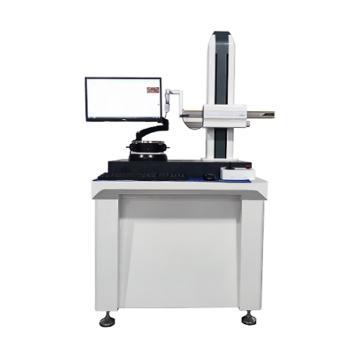Roundness Testers
High Precision Roundness Tester Machine
Heavy-Duty Roundness Cylindricity Tester
A roundness tester is a precision instrument used to measure the roundness or concentricity of an object, typically cylindrical parts or components. It works by rotating the workpiece while a probe, often a diamond or gemstone ball, scans the surface. The tester measures any deviations from the ideal circular shape, providing highly accurate data on roundness, eccentricity, and surface profile.
Working Principle
The roundness tester operates by rotating the workpiece along its axis. As the workpiece spins, a probe attached to the system detects any deviations from the perfect round shape. These deviations are recorded and analyzed, producing detailed measurements that help identify imperfections like ovality, eccentricity, and uneven surface profiles. The system then processes this data using specialized software to generate accurate roundness readings, often presented in graphical form.
Applications
Roundness testers are widely used in industries such as automotive, aerospace, precision machinery, and electronics. In automotive manufacturing, they are used to ensure the precise roundness of engine components like shafts, pistons, and bearings, which are critical for engine performance. In aerospace, roundness testing is crucial for turbine blades, landing gears, and other vital components, where precision is paramount for safety and efficiency. The machinery manufacturing industry relies on these testers to measure critical machine parts, ensuring smooth operation and reduced wear. In electronics, they are used to measure the roundness of connectors and other small, precise components, where even the smallest deviations can affect performance.
Differences between a roundness tester and a roundness cylindricity tester
The roundness tester and the roundness cylindricity tester are both precision instruments used to measure geometric deviations, but they differ in the scope of their measurements. A roundness tester is primarily used to assess the roundness or circularity of an object, typically measuring how much a part deviates from an ideal circle. It is ideal for testing components like disks, rings, and shafts where the focus is on the roundness of the outer surface.
On the other hand, a roundness cylindricity tester measures both the roundness and the cylindricity of a part, which includes deviations along the entire length of a cylindrical surface. This tester evaluates not just how round the part is, but also checks for straightness and overall form errors along the length of cylindrical parts, such as shafts or tubes. While the roundness tester focuses on a single plane, the cylindricity tester provides a more comprehensive analysis of 3D geometrical accuracy.
Roundness testers are indispensable tools for ensuring quality control and maintaining high manufacturing standards in these industries, providing the precision needed for parts to function at their best.



